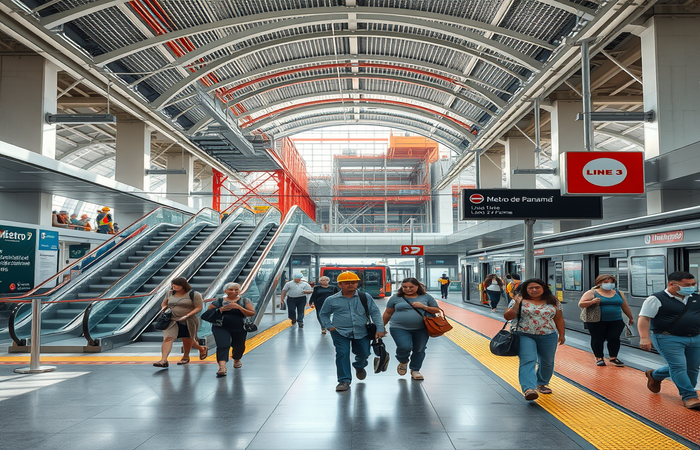Panama Metro: Albrook Station Expansion & Line 3 Integration
Metro de Panamá is expanding Albrook station, integrating Line 3, a monorail, while maintaining Line 1 operations. Discover how they’re overcoming challenges and enhancing the passenger experience!

Panama City, Panama – October 26, 2023
The Panama Metro (Metro de Panamá), a key element of the country’s public transportation infrastructure, is undertaking a significant expansion project at the Albrook station. This initiative is crucial for the seamless integration of the upcoming Line 3, a monorail system designed to alleviate traffic congestion and connect Panama City with its western suburbs. The project, which involves the partial dismantling and reconstruction of existing infrastructure, poses several engineering and logistical challenges. It is being implemented while maintaining the daily operations of Line 1, the existing metro line. This expansion not only aims to increase the capacity of the station but also to enhance accessibility and improve the overall passenger experience. The project is a testament to the commitment of Metro de Panamá to providing a modern and efficient public transport system. The project also indicates the commitment to developing and adapting the existing infrastructure to meet the growing transportation demands of a rapidly expanding city.
Challenges in Integrating Line 3
The primary goal of the expansion at Albrook station is to facilitate the integration of Line 3. This new line, utilizing a monorail system, will significantly alter the flow of passengers through the station. The existing infrastructure, designed primarily for Line 1, needs to be adapted to accommodate the increased passenger volume and the interchange between the two lines. The most significant challenge involves constructing a new station component for Line 3 west of the current facility while ensuring minimal disruption to the ongoing operations of Line 1. This entails carefully phasing the construction process, including the partial dismantling of the current roof and the installation of temporary pedestrian walkways. Furthermore, the expansion includes the removal of existing escalators and elevators to create space for the new infrastructure, necessitating temporary measures to maintain passenger flow and accessibility.
Temporary Measures for Passenger Management
During the construction phase, Metro de Panamá is implementing several temporary measures to mitigate the impact on passengers. Due to space limitations, escalators will be unavailable during the initial phase of the construction. Consequently, passengers will be encouraged to prioritize the use of elevators, especially for those with reduced mobility, pregnant women, and the elderly. These measures are critical to ensure the safety and comfort of all passengers. Temporary pedestrian walkways will be installed to maintain continuous access between Albrook station and the Transport Terminal, allowing passengers to navigate the construction zone safely. Effective communication and signage will be crucial to inform passengers about the changes and guide them through the station. Metro de Panamá is committed to minimizing disruptions and ensuring a smooth transition throughout the construction period by regularly communicating with the public about the changes.
Enhancements and Accessibility Improvements
The expansion project is not just about integrating Line 3; it also provides an opportunity to enhance accessibility and modernize the overall passenger experience. The new station component for Line 3 will feature a 35-meter-long connecting walkway equipped with new escalators, stairs, and elevators. These features are designed to improve connectivity between Lines 1 and 3 and also to create a more inclusive and user-friendly environment for all passengers. The design prioritizes universal accessibility standards, ensuring that individuals with disabilities can navigate the station with ease. The project will include improved lighting, ventilation, and wayfinding systems, which will contribute to a safer and more comfortable passenger experience. The enhancements will contribute to a more modern and efficient urban environment by promoting the use of public transportation and reducing reliance on private vehicles.
Conclusion
The Albrook station expansion project undertaken by Metro de Panamá represents a pivotal step in strengthening the city’s public transportation network. By carefully integrating Line 3 into the existing infrastructure, the project addresses the growing transportation demands and significantly improves the connectivity and accessibility of the metro system. The engineering challenges are significant, but they are being addressed with meticulous planning, innovative solutions, and a strong focus on passenger safety and service continuity. The temporary measures, such as the use of pedestrian walkways and prioritization of elevator use, demonstrate a commitment to minimizing disruptions during construction. The long-term benefits of the expansion, including improved connectivity, enhanced accessibility, and a modernized urban environment, will positively impact the lives of Panamanian citizens. The project is a testament to the city’s vision for sustainable urban development, highlighting the importance of robust and efficient public transportation systems in a rapidly evolving city. Metro de Panamá’s dedication to completing the project underscores their commitment to providing a world-class public transportation experience for all.
Summary of Companies Involved:
Although the original text does not name any specific companies, here is a general breakdown:
- Metro de Panamá: This is the state-owned company responsible for the operation and expansion of the Panama Metro system. It’s the entity leading this project.
- Construction Firms: These are the companies contracted to perform the civil engineering and construction work. These would be responsible for dismantling existing infrastructure, building the new station components, and installing new escalators, elevators, and walkways.
- Engineering Consultants: These companies provide design, planning, and project management services. They’d be responsible for the technical aspects of the project.





